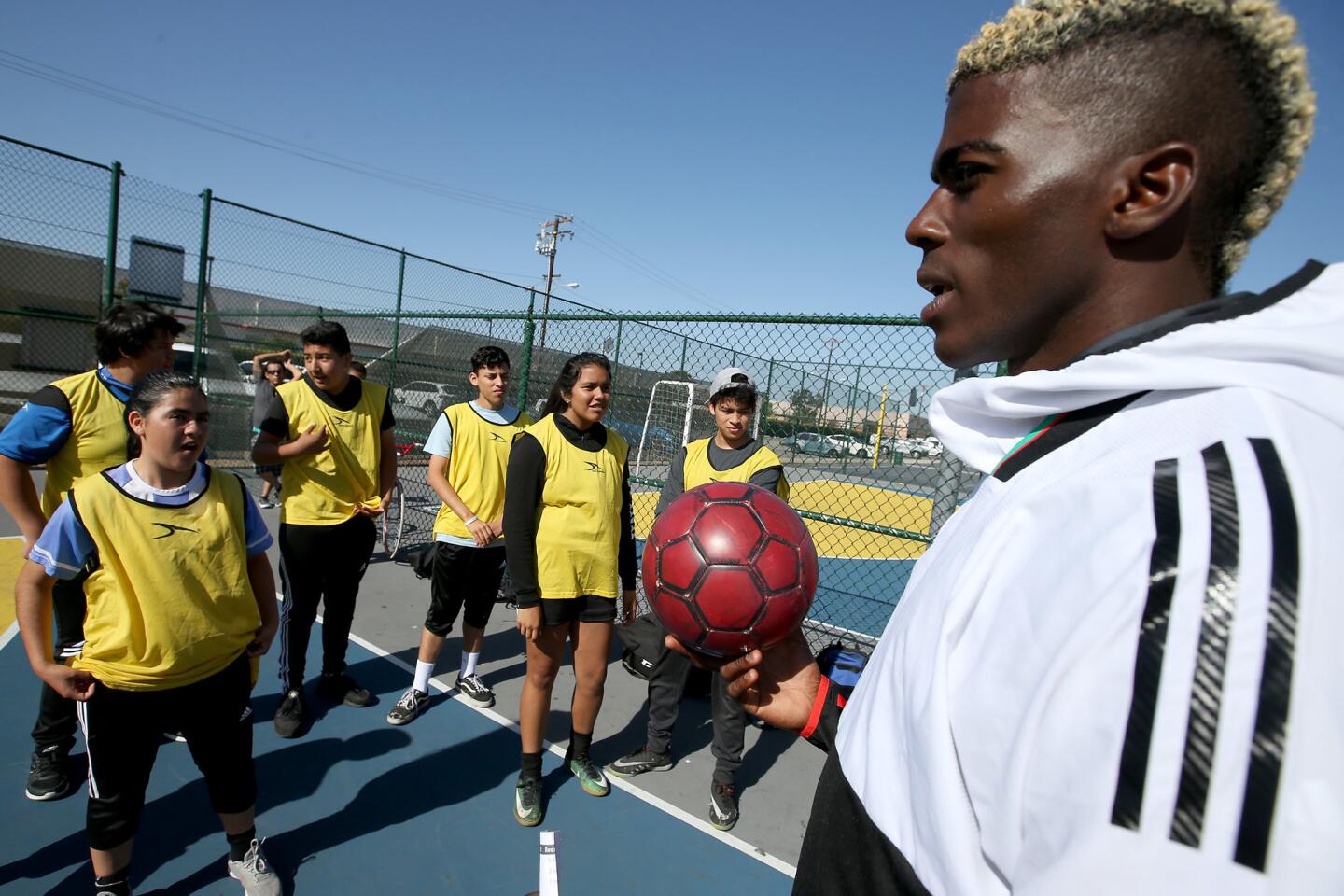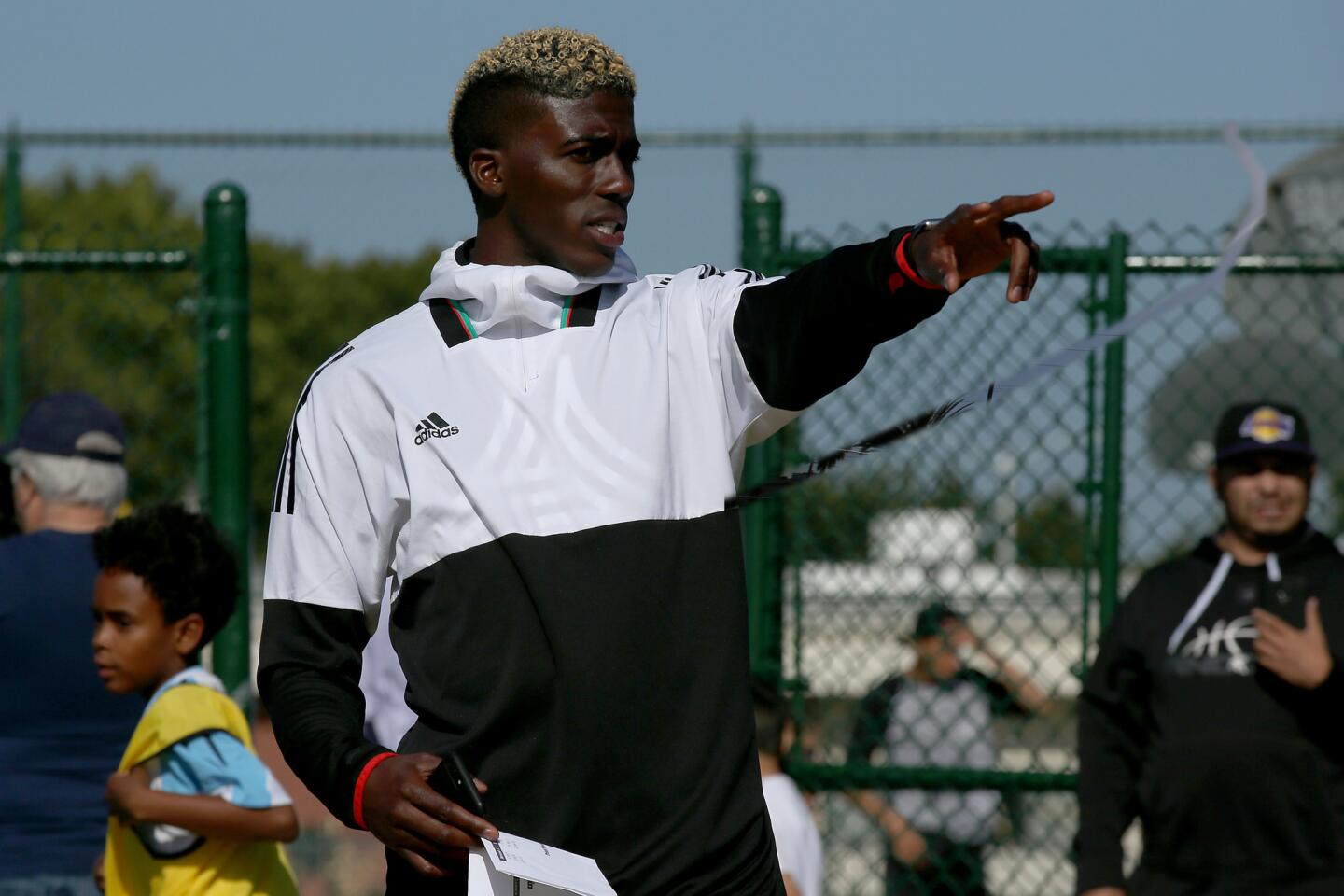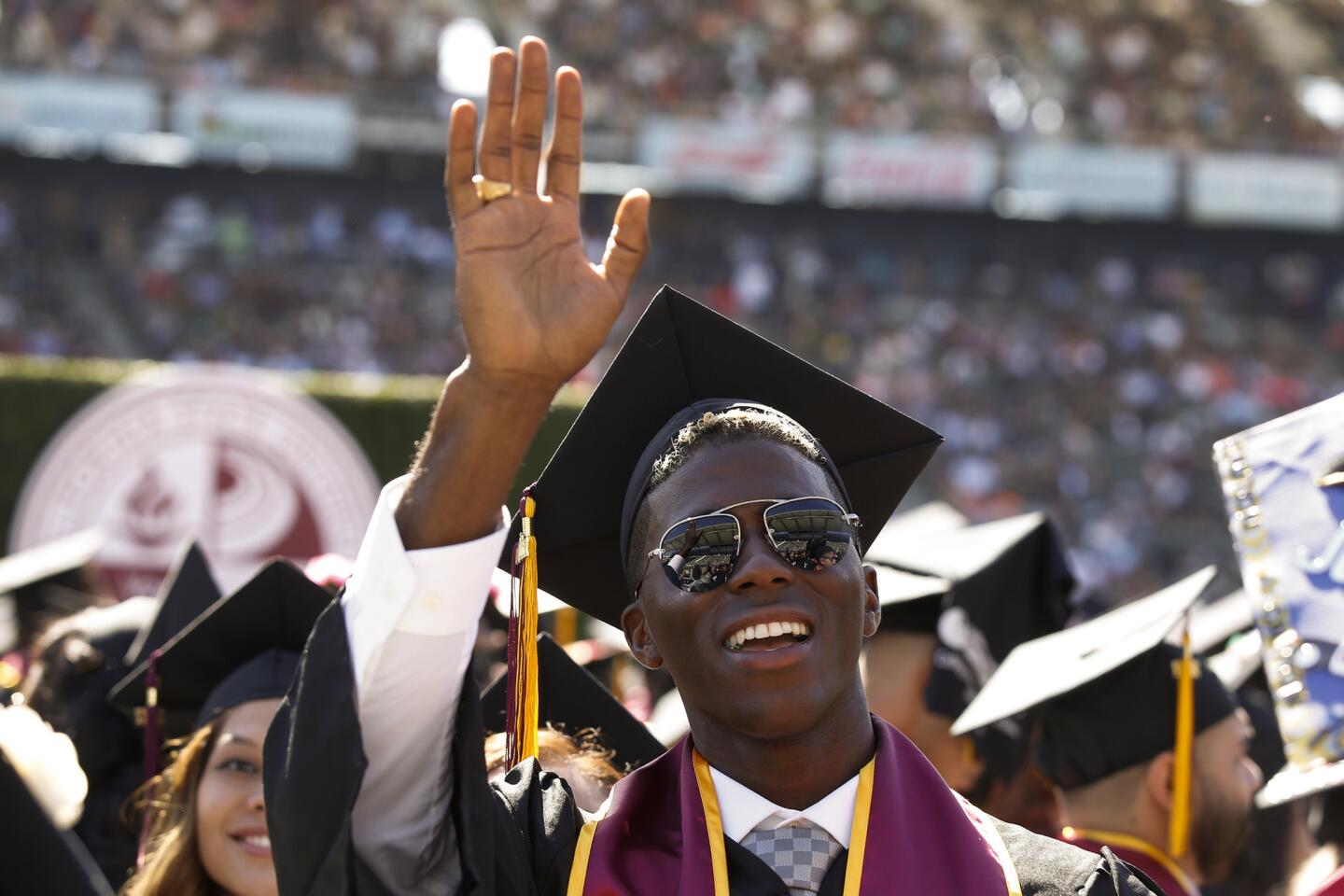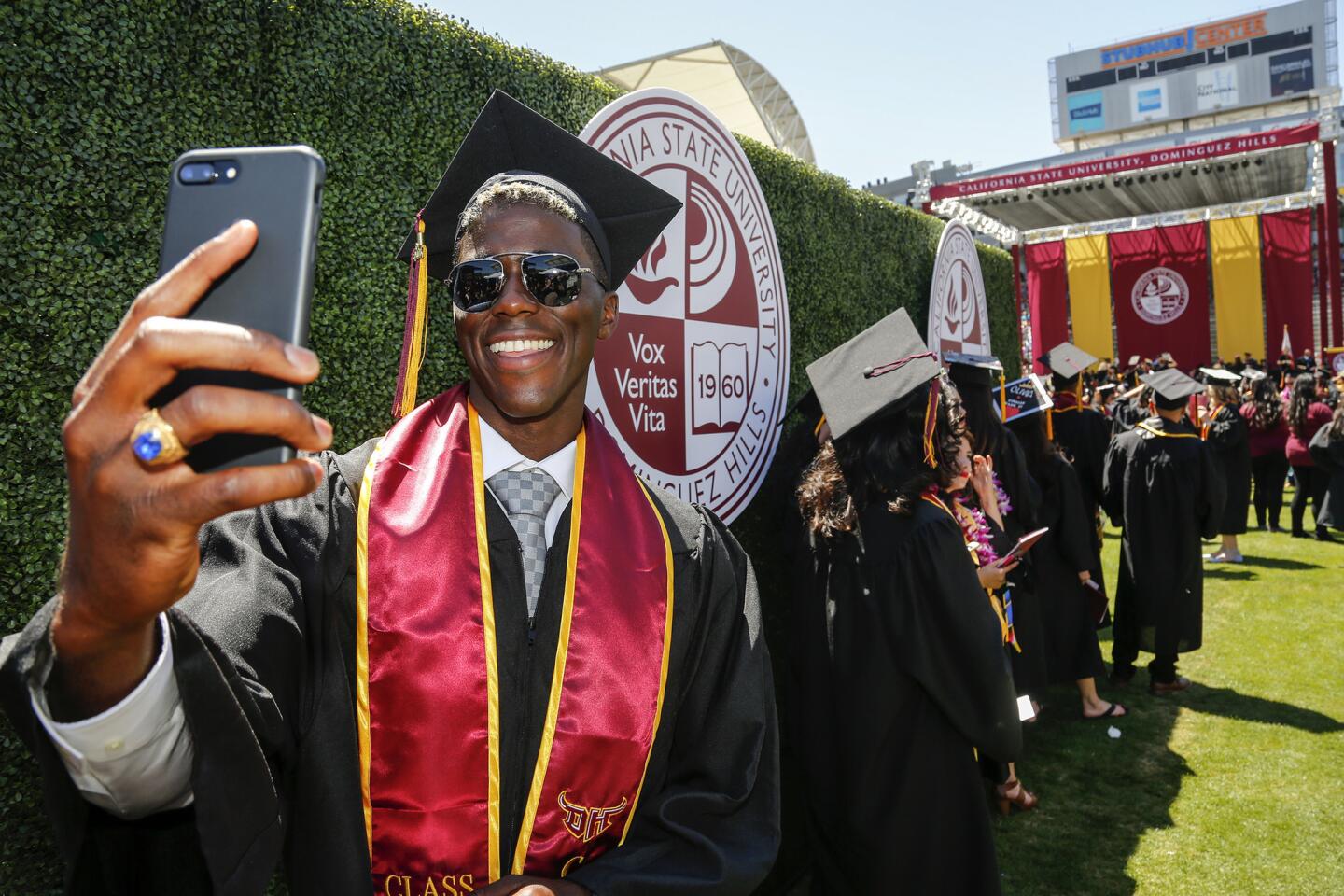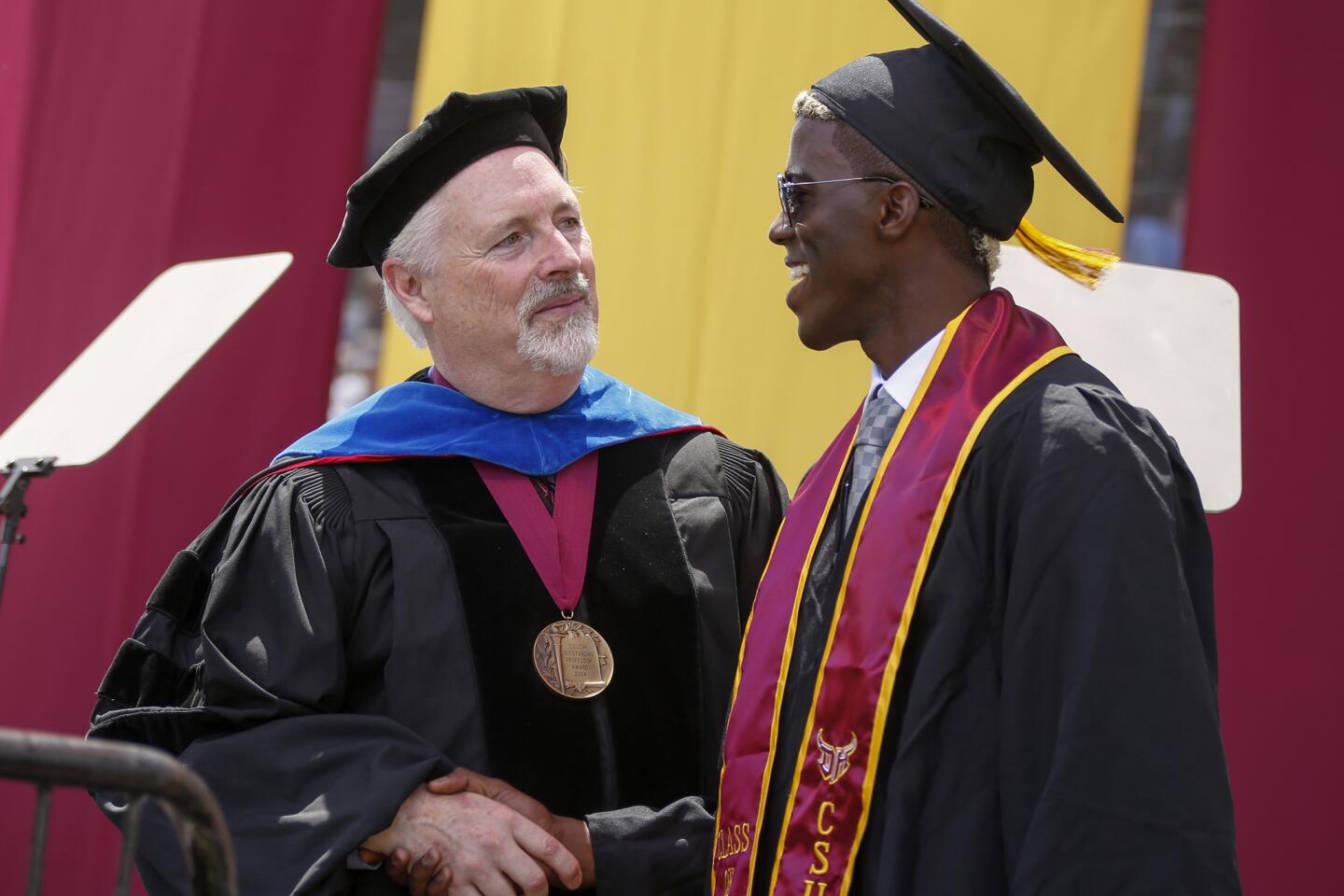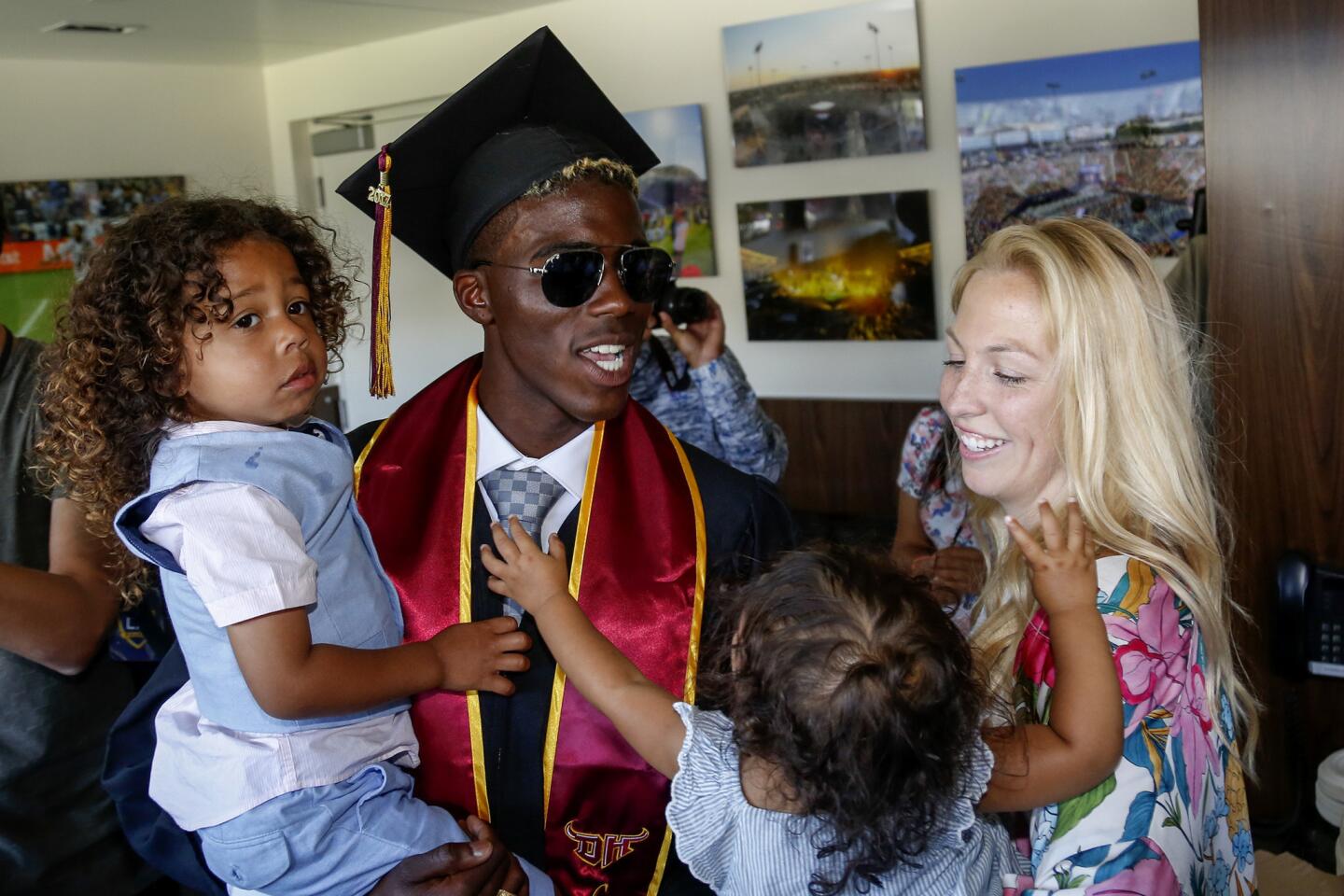Road to success never ventured far from home for Galaxy’s Gyasi Zardes
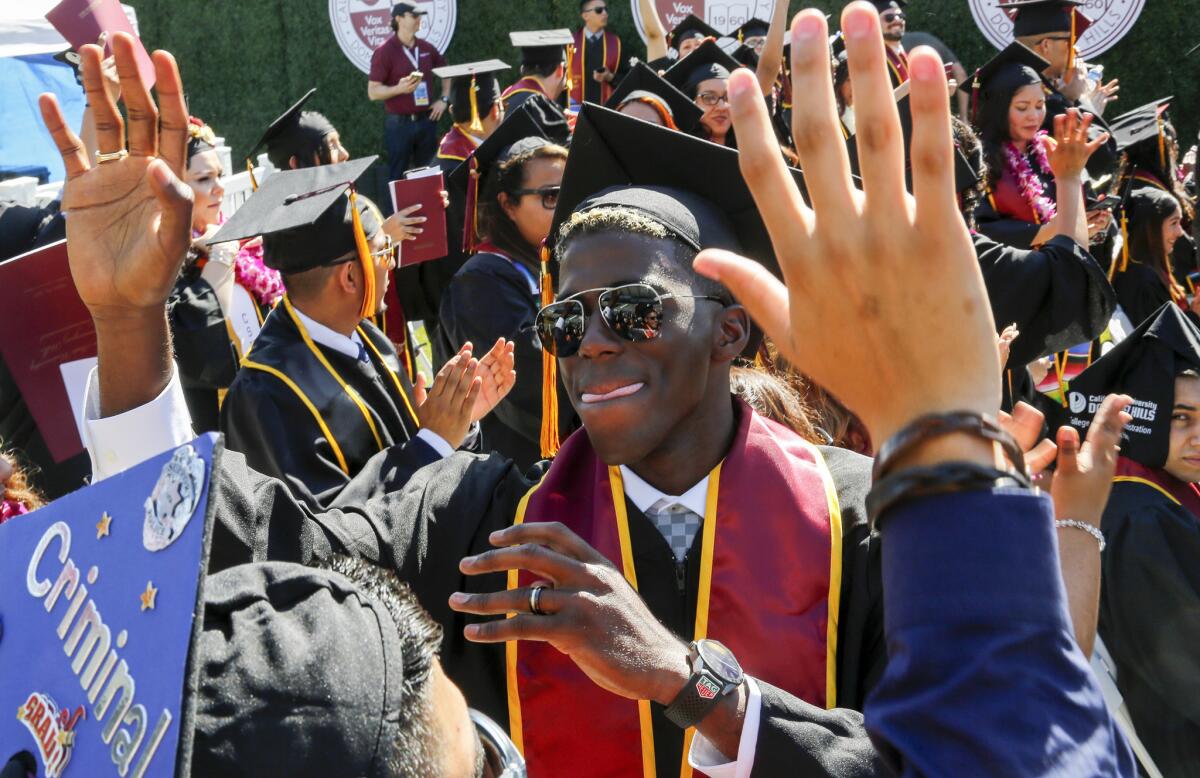
The high points of Gyasi Zardes’ life have been confined to a narrow sliver of land between Carson and Redondo Beach.
At one end, Zardes bought his first house and started a family. At the other he made his Major League Soccer debut with the Galaxy, made his first start for the U.S. national team and, on May 19 on that same StubHub Center field, made a short walk across a stage to pick up his college diploma.
But it’s the area in between, on the harsh streets of Hawthorne, where Zardes is making the biggest difference.
It’s where he inspired construction of three futsal courts, transforming a park once overrun by derelicts and drug dealers into a refuge for kids with nowhere else to go. It’s where he mentors at-risk high school students and Special Olympic athletes and has handed out thousands of dollars worth of soccer equipment — once taking the custom-made cleats off his own feet and giving them to a shy boy before driving home barefoot.
And it’s where he has patrolled the neighborhoods as an intern with the Hawthorne Police Department, serving the community by serving as an example.
“The thing about Gyasi is, he’s legit,” says Chris Cognac, a Hawthorne police sergeant. “There’s no cameras. There’s nothing.
“He’s really an example of what athletes should be. [He’s] making a better place.”
::
On a recent Thursday, about four hours after finishing a training session with the Galaxy, Zardes wheels his Porsche SUV into the parking lot at Memorial Park, where more than 60 kids have gathered.
The weekly futsal games are played on three tennis courts refashioned by the Galaxy 18 months ago, at Zardes’ urging. When he’s in town, Zardes makes a point of attending, sometimes offering to play, other times simply offering advice and support.
“It’s a bunch of kids who just, they’re staying out of trouble, staying off the streets,” Zardes says. “I remember being a kid in Hawthorne. So every opportunity I get to go over to the fields and help out, I’m going to take it.
“That little gesture can change somebody’s life forever. You just never know.”
Evidence of that isn’t hard to find. Brianna Campos, a 16-year-old Hawthorne High junior, doesn’t even like soccer but she shows up every week just the same. It’s the feeling of belonging that draws her, she says.
“You had a lot of kids just roaming the streets. This actually has helped. You see a change in the community. You see people coming together,” says Campos, who says her grade-point average has jumped from 1.6 to 3.0 since she became a regular at the futsal games.
I was one of the lucky ones. I just try to do whatever I can to help these kids in tough situations.
— Gyasi Zardes
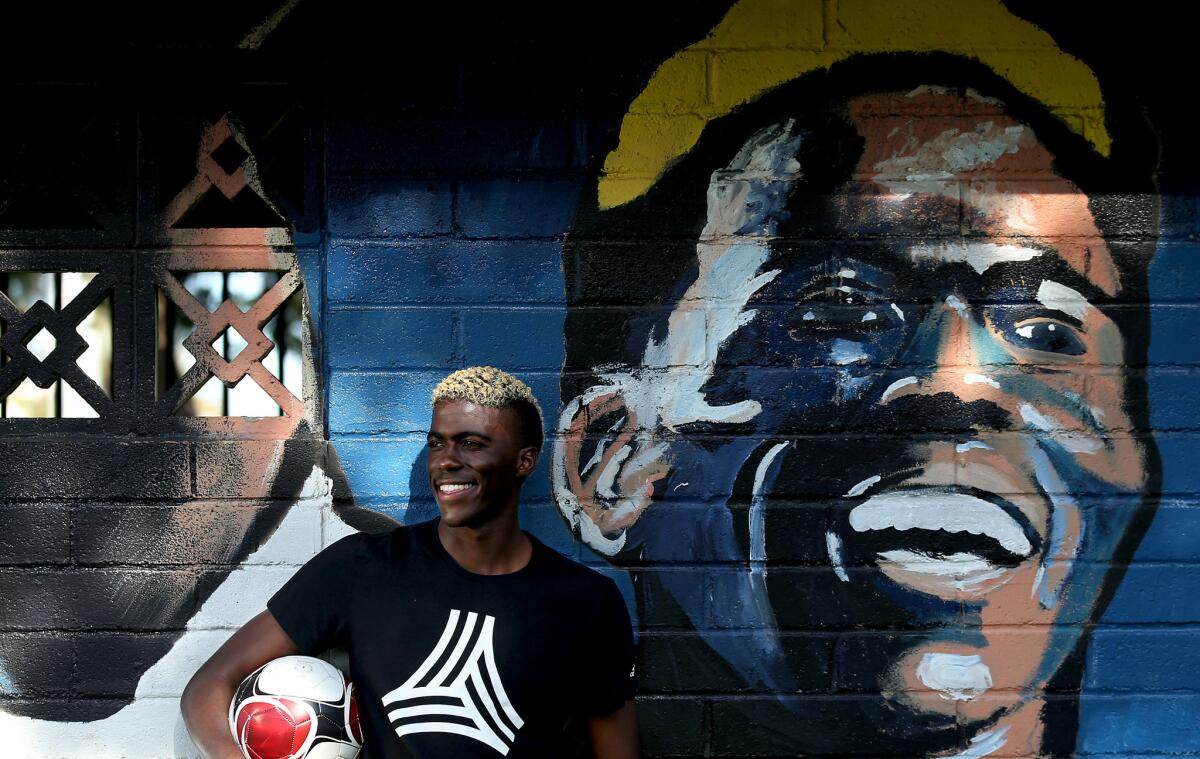
One boy befriended a neighborhood girl at the park and wound up asking her to the prom. She said yes, then giggled.
Just after 4 o’clock the rest of the kids — ranging in age from 8 to 18 and of every size, shape and ethnicity imaginable — line up along the midfield stripe and are divided into six teams. The games that follow are fierce, if not particularly skilled, affairs in which no one keeps score.
A compact version of soccer — think arena football compared to the NFL — futsal is played on a hard court a fraction of the size of a regulation soccer field. The teams are smaller, too, generally five to a side. But the Hawthorne program has become so popular that Cognac, who manages it, frequently puts eight or nine kids on each team, stopping play every two minutes to sub in players from the sidelines.
As the games draw to a close, parents begin gathering outside the fenced-in courts. Two Latina mothers chat with a woman in a hijab. A father arrives carrying a toddler. Nearby a grandfather waits with a 6-year-old girl whose father is in prison.
“They never would have talked,” Cognac says of the eclectic group. “But futsal has brought everybody together.”
After the games Zardes, dressed in a black long-sleeve T-shirt and black sweatpants, and Cognac, wearing his police uniform and a pistol on his hip, meet with parents and their children in groups of twos and threes to talk about grades or behavioral issues.
“None of this would have happened had the futsal courts not happened and Gyasi not made it out,” the police sergeant says. “It’s the seed that sprouted the tree. There was nothing at that park. It was drug dealers and homeless people.”
::
Cognac knew Zardes long before the soccer player was winning MLS Cups with the Galaxy or scoring in World Cup qualifiers for the national team. That was more than 15 years ago, when Cognac was a patrolman and Zardes was among the neighborhood kids the police would regularly chase off the tennis courts at Jim Thorpe Park — courts marked by a pictogram of a black-and-white soccer ball with a red slash through it.
Zardes grew up two blocks away, in a first-floor apartment in a tan 42-unit complex on Kornblum Avenue, the center of a 40-block area known as Moneta Gardens and a place where the sound of gunfire and the din of police helicopters are part of the daily soundtrack.
“Friends that he went to high school with are either dead or in prison,” says Zardes’ wife Madie, a bubbly former sprinter and swimmer who met her husband when both were student-athletes at Cal State Bakersfield.
Zardes and his four siblings, who slept in bunk beds in the crowded two-bedroom apartment, avoided a similar fate largely because of the attentive parenting of their father Glenn, an accountant, and mother Linda, who worked for a bank. Neither finished college but four of their five children did.

Gyasi Zardes kept a promise to his father by graduating from Cal State Dominguez Hills this month. He is serving as an example and inspiration to kids in the old neighborhood: If he can do it, so can they.
School was so important that Zardes, who promised his father he would get a college degree, delayed signing with the Galaxy until he had finished his junior season at Bakersfield. He then got the team to agree he could complete his education at Dominguez Hills.
That led to the unusual sight of Zardes, who will make $577,500 this season, packing a lunch and walking from the Galaxy locker room across a barren parking lot to class two afternoons each week.
One of his fellow students was Mashud Ogunlaja, a soccer fan from Nigeria who was taking molecular biology classes. He was so stunned to find Zardes studying beside him, he volunteered to attend the Thursday futsal sessions and tutor kids struggling with their homework.
“Everybody needs a hero,” Ogunlaja said of Zardes. “To the kids, he’s a role model.”
::
The kids.
Zardes has two of his own — a 14-month-old girl named Maylie Faith and a 3-year-old boy, Gyan — but really every kid in Hawthorne is his. And because many of them don’t have the kind of parents he does, Zardes tries to fill the void.
“I was one of the lucky ones,” he says. “There are kids out there who don’t even know who their father is. I can only imagine growing up, not having your dad in your life. I just try to do whatever I can to help these kids in tough situations.”
So next fall he’ll begin a mentoring program for two freshmen, a boy and a girl, at Lawndale Leuzinger High, where Zardes was a football and soccer star.
“Freshman year is the most important year,” Zardes says. “If you get straight A’s, starting freshman year, you can write your ticket to any college.”
When Zardes heard about another neighborhood boy who was attending an honors school but was in danger of falling behind because he didn’t have a laptop, Zardes bought him one. When he visited “A Place Called Home,” a community center serving at-risk kids in South Central L.A., and learned the students there didn’t have computers, he got the Galaxy to kick in $25,000 to buy some.
Don’t expect Zardes to volunteer any of that information, though. While some celebrities see charity work primarily as a photo op, Zardes guards his contributions the way a master spy guards state secrets.
“It’s nothing to brag about,” he says. “I have to use this platform. And I want to use that to better to lives of other individuals.”
Some things he doesn’t even share with his wife, out of concern that showing compassion will somehow be seen as showing off.
“There are some things I don’t even know that he does,” Madie says. “I’m like ‘holy moly, I didn’t know that you did that.’ He’s… just always wanting to help other people.
“He definitely inspires me. I look up to him.”
Lauren Nowinski, who joined the Galaxy as community affairs director about the same time Zardes joined as a player, says it’s easier to get him to show up at an event that it is to get him to leave.
“He’s so passionate and so true with what he’s doing,” she says. “He’s not there for the PR stunts. He wants to be involved. I’m like ‘your appearance is done’ and he’s like ‘no, no. I’ve got to sign these autographs. I want to play with these kids.’ ”
That, too, is a product of his childhood.
Linda Zardes took her son, a hardcore Galaxy fan who had a David Beckham poster tacked to his bedroom wall, to several games when he was a boy. On one occasion Gyasi joined a group of kids waiting for autographs, only to have the player — who Linda Zardes won’t name — turn away without signing.
Her son never forgot the slight. So after a recent game, when his mother tried to hurry him away from fans to his car, Gyasi admonished her. “Mom, remember?” he said. “I used to be one of those kids.”
Linda Zardes tells that story standing in the back of a noisy and crowded luxury box at the StubHub Center. Graduation day has dawned hot and bright, turning the three-hour ceremony into a test of both patience and endurance.
So Galaxy president Chris Klein has turned his stadium suite over to the family, stocking the refrigerator with wine and soft drinks. As she waits for her son to receive his diploma, Linda Zardes alternately smiles and dabs at the tears in her eyes. Nearby, Glenn Zardes beams.
“I’m very proud of him,” he says. “I told him he had to finish school.”
Ask him why, though, and the senior Zardes grows a little fuzzy. His son, at 25, will earn more this year than most people his age will make in a decade. And the chance an injury will strike him down before the prime of his career seems little more than a remote possibility.
It’s what the diploma symbolizes, then, that really matters. Because it proves that a kid from just up the freeway, a kid who grew up ducking bullets and dodging gangs, can succeed. It proves that a kid from the neighborhood can make it, in sports and in scholarship, if he or she can simply muster the drive and determination to do so.
So while a diploma is nice, it won’t be the most important thing with Zardes’ name on it. Cognac says a handshake deal was reached last week to build two futsal courts in Jim Thorpe Park, where Zardes once played.
And the policeman plans to replace the “No Soccer” signs with ones that read “Gyasi Zardes Center.”
And by coming back to Hawthorne every week, Zardes has proven that you don’t have to leave the city to escape its clutches.
Twitter: kbaxter11

